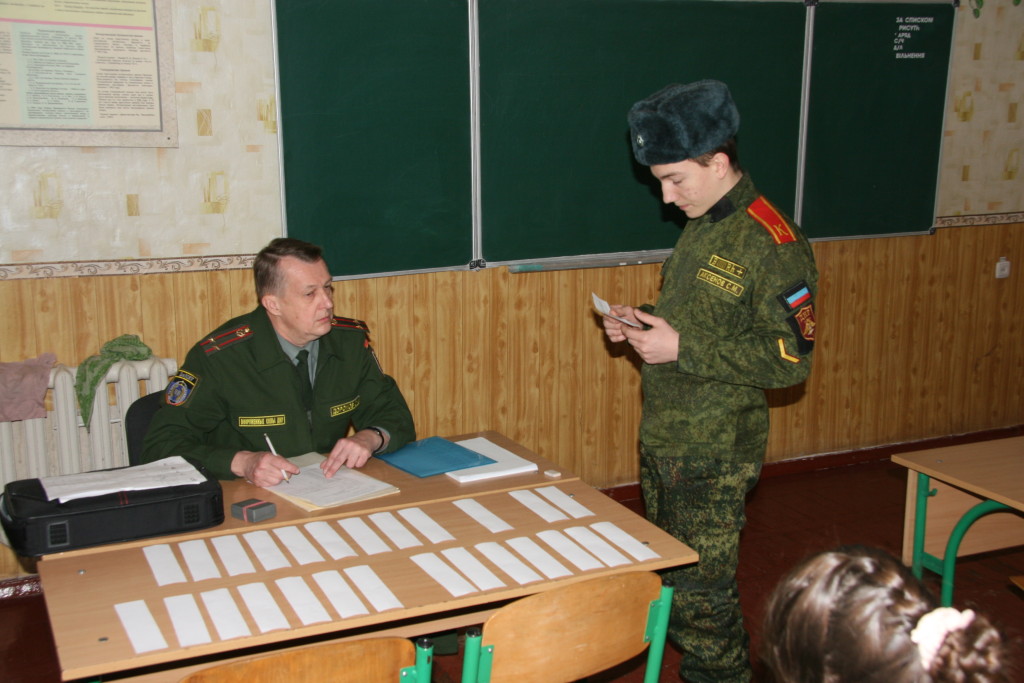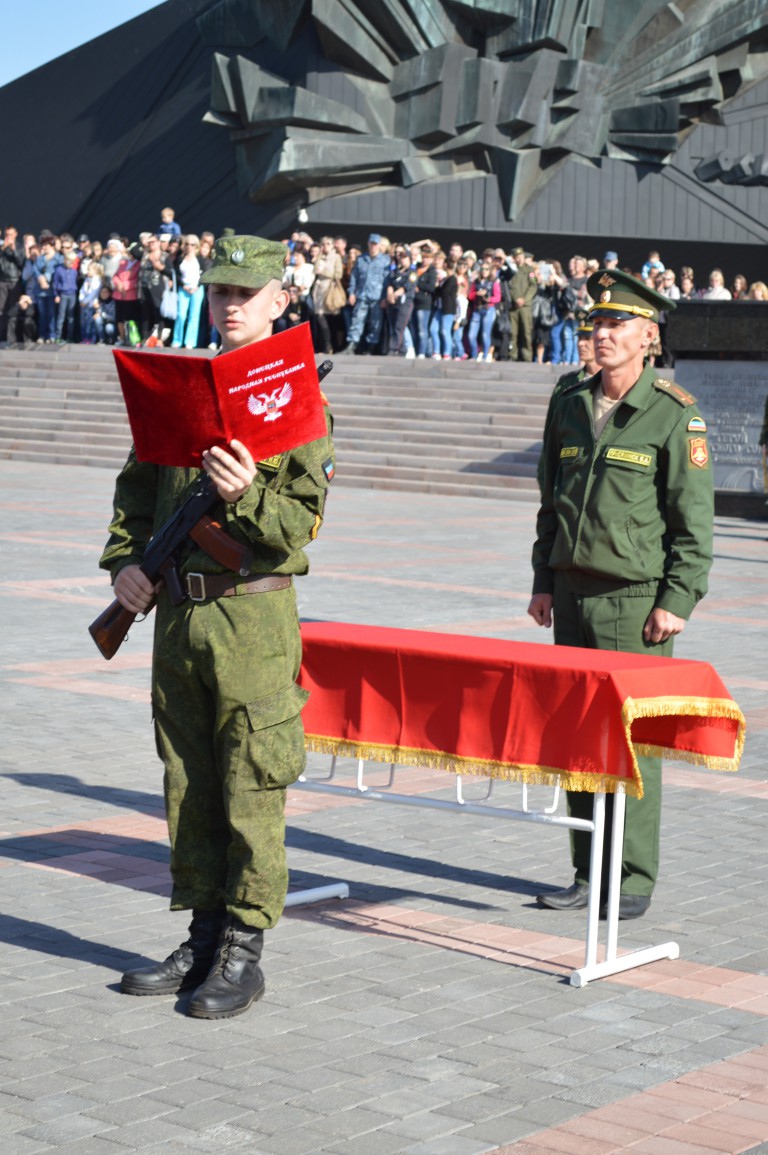Education in military universities. Natural selection
01.01.2016
What is the life of a cadet like?
Admission to the higher military educational institution fundamentally different from entering a civilian university. Acting, yesterday's schoolchildren should be aware that the next 5 years of study will be held away from relatives and people close to him. Thousands of school graduates who want to serve the Motherland must go through the initial stage of admission to various military institutions of the country.
Military "Abitura"
"Abitura" (admission) starts from the beginning of July and lasts until the end of the month. First stage includes the training of future military personnel.
Young guys become familiar with such concepts as: morning exercises, mass sports work, marching in formation, a clear daily routine, marching step and much more, without which most people are used to doing without in the “civilian”.


Several dozen guys live in the same room, called the barracks. They are preparing for the entrance exams professional selection, which will show who is ready to serve in the armed forces and who is not.
After 2 weeks, future cadets undergo a thorough medical checkup, as a result of which persons with a deviation in health will be identified.
Passing exams takes place in accordance with the faculty in which the applicant wishes to study, and in the future he will serve in this specialty. As a result of the delivery entrance examinations the applicant is enrolled in the university, puts on military uniform, is cut short in accordance with the charter and receives cadet shoulder straps.

KMB or Young Fighter Course
It starts from the end of July and lasts until the end of August. At this stage, the future soldier undergoes initial training. It includes: outfits, “sacred” military rituals (getting up, morning inspection, evening verification, lights out), studying the articles of the charter, training in the drill step, march throws, performing according to the standard of putting on a gas mask and OZKA.
Fire and physical training is an integral part of the training of any soldier.

The order in the barracks is ensured by the cleaners, who are appointed every morning before the start of charging.
The duties of the cleaner include: sweep the dust from under the beds and bedside tables, sweep between the rows of beds, wipe the floor with a damp cloth if necessary, take out the trash, wipe the dust from all flat surfaces.
Each cadet has his own bedside table, where he can store washing accessories, brushes for cleaning shoes and clothes, handkerchiefs, collars (sewn material), small personal items, notebooks, textbooks, charters.
Many guys former students, accustomed to sneakers and other civilian shoes, quickly rub blisters on their feet. Behind medical care they can go to the medical center - infirmary.
Upon completion of the KMB course, all personnel are redeployed to places of further education (academy, university). Upon arrival at the academy (high school), cadets receive full dress uniforms. You need to prepare it for use yourself: the guys themselves sew shoulder straps, sleeve chevrons, insert emblems into the lapel of the collar. They also polish their shoes to a shine, smooth out the arrows on the trousers.
Three days later, the main military ritual, the oath, takes place in a solemn atmosphere. The oath is one of the most important and significant events in the life of every soldier, which makes him personally responsible for the defense of his country.

Cadets weekdays
The daily life of a first-year cadet, as well as subsequent ones, follows the same daily routine: getting up, morning formation, exercises, on which future servicemen improve their skills. physical training, morning toilet, building for morning inspection, where it is checked appearance, breakfast, divorce for classes. Mandatory passage of a solemn march, where the cadets show their combat skills and the coherence of the unit as a whole. Classes according to curriculum, lunch, self-study, in which cadets prepare homework and repeat the charter, dinner.





Evening is given personal time when you can chat with relatives, girls, write a letter home, prepare a form for the next day.
The day ends with the formation for the evening verification, during which the personnel of the course and the list of persons forever listed who died the death of the brave are read out. Hang up.
Outfit
Without exception, all military personnel go to outfits. The outfit is assigned to maintain internal order, protection of personnel, weapons, ammunition, military equipment, premises. And also to monitor the state of affairs in the unit and take timely measures to prevent offenses.
At the beginning of each month, a list of outfits is created, which indicates the dates on which this or that serviceman goes to the outfit.
Outfits are external and internal. The inner outfit is on course, the outer one is patrolling.
military partnership
“The military team is a family! “Practically my entire service takes place in this family,” the freshman said. Everyone helps each other in studies, sports and other activities. Today you helped him, and tomorrow he will help you. This is one big team, different from study groups in an institution that lives, breathes, interacts. "One for all and all for one!" - this is the motto of the military brotherhood.
Dismissal
In high school, layoffs are not that common. But if you have no comments on the service, on violation of the uniform, debts and unsatisfactory grades in subjects, then you have the right to receive a dismissal for a day. You can spend this time with your family, loved ones, friends, with your girlfriend. Leaving for the city and putting on civilian uniform clothes, the cadet should not forget about the status of a serviceman, the rules of conduct in the city and military courtesy.
— The life of a cadet is very diverse and full of bright events that are radically different from ordinary student life. Years of service at the academy cannot be described on paper; Military men are never former - this goes through our whole life. In the army, a guy becomes a man. A man, a defender of his Motherland, a defender of his relatives, his family, his future children.
Every officer who graduated from a military educational institution remembers that talk about the upcoming distribution began long before graduation. It must have stuck in the memory of many that other fellow students who did not shine in their studies were suddenly appointed to a prestigious position thanks to the intervention of an influential guardian. Yes, a few months before the distribution, each graduate was interviewed on the subject of where he wants to serve. At the same time, the priority right to choose was for gold medalists and those who graduated with honors. However, after the presentation of documents to graduates, there were many surprises. On this occasion, there was even a joke that the basic principle of distribution is "From each - according to his abilities, to each - according to his kinship."
How is the distribution of graduates military educational institutions Now? The "Guidelines for the organization of the work of a higher military educational institution of the Ministry of Defense of the Russian Federation" states that the commanders of student and cadet units and the teaching staff of the university are involved in the distribution work, and the basis for determining the further official mission of a graduate is the results of the state final certification and his performance characteristics (certification). In addition, the marital status, health status of the graduate and his family members are taken into account. In other words, the extent to which arguments in favor of a particular graduate will be taken into account and how publicly the distribution will be carried out depends on the head and the personnel department of the university.
- By the time of graduation, each cadet already knows the place of further service, up to locality, - says the head of the Novosibirsk Military Institute, Major General Vladimir Yegorkin. - For distribution, commanders prepare lists, where, in rating order, they indicate the results of the studies of future officers, their merits in the social and sports life of the unit, marital status. Gold medalists and those who graduated with honors enjoy the right to choose. With each graduate, we have conversations with the deputies. From 70 to 90 percent of graduates get to serve where they wanted.
Regarding calls from parents who want to influence the distribution, the head of the institute noted that there were almost none. Moreover, the aspirations of parents to better accommodate their son do not always coincide with the plans of the future officer himself. The results of an anonymous rapid survey of graduates conducted at the university four months before the exams show that 56 percent want to serve in the Armed Forces and only 2 percent want to quit after graduation. However, more than 40 percent of the respondents consider service in other power structures to be more prestigious and attractive.
The rating system, which takes into account the results of studies and other activities of graduates during their distribution, which has been in place for several years at the Omsk Tank Engineering Institute, allows the leadership to make the distribution mechanism more transparent and fair. And in the battalion of cadets of the Novosibirsk Military Institute, commanded by Lieutenant Colonel Konstantin Andrianov, they decided to go even further in this direction. In the cadet units, special attestation notebooks have been set up, where the main points of the educational and service activities of future officers are recorded, which is then taken into account when determining their place in the overall rating.
However, a conversation with a group of graduates revealed their disbelief in the real impact of learning outcomes on distribution. And it turned out that many did not even see the list with rating indicators sent by the unit commanders to the headquarters of the institute. The situation with the distribution of graduates who graduated from the university with a gold medal or a diploma with honors is clearer. The distribution of the rest, according to them, depends on the established or not established relations with the commanders and the capabilities of relatives.
The idea of the need to develop a more effective mechanism for the distribution of graduates of military educational institutions and its consolidation in the relevant regulations as a guarantee of social justice was also voiced in a conversation with teachers of the department of humanitarian and socio-economic disciplines of the university, headed by Candidate of Philosophical Sciences, Associate Professor Colonel Anatoly Gursky. The lack of faith among cadets that the distribution will depend on their attitude to study can negatively affect the formation of personal qualities future officer.
The idea of creating a transparent mechanism for the distribution of future officers was also supported by the head of the Kemerovo branch of the Military University of Communications, Major General Anatoly Rubis: “Each cadet from the 1st year must be sure that there will be honor according to his real merits.” If the cadets have serious doubts about this, then something needs to be changed.
“After June 20, we graduates were given two documents: 1) a list of cadets who graduated from college, compiled according to the seniority of points, according to which vacancies were to be sorted out ... 2) a list of vacancies offered from the General Staff. Each junker had to draw up a list of vacancies that he would like to take, in accordance with his seniority number. During the analysis of vacancies, those that were selected before him were deleted from the list, and thus natural selection was obtained.
This episode from the memoirs of Marshal Soviet Union B.M. Shaposhnikov refers to 1903. Agree that even after a century, you can’t imagine anything better and simpler in principle.





